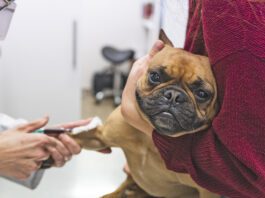Knee Injuries in Dogs
Poor conformation may be partly to blame for dog knee injuries, but a dog’s weight, physical condition, and activities make a big difference as well.
Bulging Eyes in Dogs
Bulging eyes in dogs could be due to disease—sometimes bad enough to cause an eye to pop out.
Alopecia In Dogs
Treating alopecia in dogs starts with determining the underlying cause of the hair loss.
How to Get a Urine Sample from a Dog
A urine sample is like liquid gold to your veterinarian. It contains so much information about your dog’s health, including whether there is a urinary tract infection or crystals, kidney disease, liver disease, or diabetes.
Skin Lesions and Cancer
Not all lumps that you find on your dog’s skin are cancerous – and even some of those that are cancerous are benign.
Why Do Dogs Chatter Their Teeth?
If you’ve ever seen your dog’s teeth chattering, you’ve probably wondered why it’s happening and if it’s cause for any concern. Here are some of the reasons you may see this odd behavior.
Why Do People Crop Dog Ears?
Some dog breeds were developed for certain jobs for which a cropped ear was thought to minimize the risk of injury. Today, however, that rationale makes little sense.
How to Identify and Buy Therapeutic-Quality Essential Oils
Essential oil diffusers are a popular aromatherapy accessory for dogs – but some essential oils are bad for dogs. Here’s how to use a diffuser safely and effectively around your dog.
Why Do Dogs Yawn?
What’s it mean when your dog yawns? Humans are more likely to yawn when bored or tired, but dogs tend to yawn more when they are mildly stressed. If he yawns when you pet him, he’s probably a little uncomfortable.
Dog Vaccine Requirements
Determining what vaccines are necessary for dogs depends somewhat on his lifestyle. A stay-at-home dog doesn’t need as much protection as a dog encountering many other dogs.
What Can Dogs Drink Besides Water?
Owners sometimes want to give their dogs some almond milk, coconut water, orange or cranberry juice, or broth. Which liquids are safe for dogs?
How to Tell if Your Dog Is Going Blind
Signs of blindness in dogs start with slight behavior changes.


















